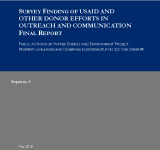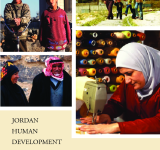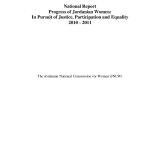plans
This study aims at developing the reality of gender mainstreaming in the public sector in Jordan with its various institutions and developing a set of appropriate recommendations. The study aimed to
The report is based on the outreach and communication survey of USAID and other donors' efforts. It is part of the Public Action Project;; which supports USAID's technical and policy investments in the Jordanian water and energy sectors and specific initiatives in the environment. The survey was designed to report on past;; current and planned donor efforts in relation to water;; energy and solid waste management – with the main focus on water sector. It is intended to help the PAP team to design communication strategies and specific behavior change campaigns by building on lessons learned from outreach efforts. The report is based on the survey consisting of 39 open-ended interviews with donor officials and managers of donor-funded projects;; and it includes analysis and recommendations on coordination with current and planned donor projects. The report recommends improvement in coordination through development of national communication strategies;; assistance in water and energy sectors to establish trust and credibility with their customers;; reduction and streamlining of programs targeting schoolchildren;; and setting up of priority areas for change through technical assessment in water and energy.
This report consists of eight chapters and aims to summarise the key concepts of human development. It introduces the Human Development Index;; provides an overview of Jordan's human development achievements;; examines the regional vulnerability context that has constrained Jordan's options in its pursuit of social and economic development;; provides a platform for the poor to express their views and perceptions in relation to their poverty status;; reviews the policies;; institutions and processes that affect the poor;; examines the government's attempts to stimulate entrepreneurialism;; promotes the application of a rights-based approach;; in which all citizen are equally empowered and have the capacity and the appropriate enabling environment that allows them to claim their entitlements according to law. Finally;; the study examines the various reform initiatives in progress and assesses the extent to which Jordan is committed to the process.
This national report is designed to trace the progress of women in various fields;; monitoring achievements;; and highlighting gaps and failures;; as well as analyzing indicators;; recommending measures;; and measuring levels of achievements in the implementation of plans and strategies. The main themes were selected according to national priorities dictated by each stage: Legal Protection for Women's Right to Access Justice;; Participation;; the Economic Empowerment of Jordanian Women;; Equality;; Citizenship and Decision-Making in Public Life. The conclusions of this report confirm that a much smaller effort was exerted at the level of providing information;; data and the provision of services in the area of providing justice and facilitating ways of achieving it. The lack of knowledge about available services among women;; whether provided by civil society organizations or government institutions;; affects women's ability to access justice negatively. Regarding the economic participation the Policies and plans that targeted empowering women economically show that the result of these policies was weak and limited. Difficulty of women’s access to job opportunities in the private sector and inequitable pay between the sexes;; lack of supporting services to working women;; including childcare Facilities;; poor matching between education outputs and skills required in the labor market and the traditional social standards that contribute to directing females towards certain professions. The report proposed general recommendations and directions that include quick solutions to deal with the main highlighted challenges.



